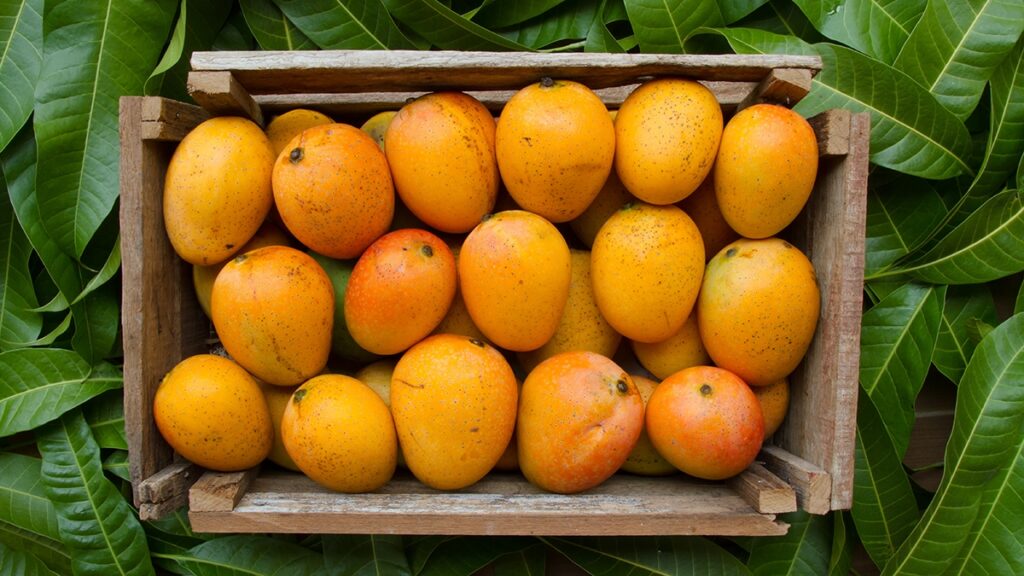Introduction to Hapus Mangoes
Hapus mangoes, also known as Alphonso mangoes, are renowned for their exceptional flavor and creamy texture. Hailing from the Konkan region of Maharashtra, India, these mangoes are celebrated for their premium quality and distinct taste. This article explores what makes Hapus mangoes so special, their history, and how you can enjoy them to the fullest.
The Legacy of Hapus Mangoes
The name “Hapus” is derived from the Marathi word for Alphonso, and it signifies a mango of superior quality. Hapus mangoes have been cherished in India for centuries, with their cultivation dating back to the 16th century. The fruit’s unique taste and texture have earned it a reputation as one of the finest mango varieties globally.
What Makes Hapus Mangoes Unique?
Hapus mangoes are distinguished by their rich, sweet flavor and smooth, non-fibrous flesh. They have a vibrant golden-yellow skin with a reddish blush and a delicate aroma that sets them apart from other mango varieties. The combination of sweetness and a hint of citrus makes Hapus mangoes a true delicacy.
The Growing Regions of Hapus Mangoes
The Konkan region, particularly Ratnagiri and Devgad, is famous for its Hapus mangoes. The region’s specific climatic conditions and soil composition contribute to the mangoes’ unique taste. The combination of warm temperatures, ample sunshine, and fertile soil creates the perfect environment for growing these premium mangoes.
Health Benefits of Hapus Mangoes
Hapus mangoes are not only delicious but also packed with nutrients. They are a rich source of vitamins A and C, which support immune function and promote healthy skin. The mangoes also contain antioxidants that help combat oxidative stress and reduce inflammation. Additionally, their high fiber content aids in digestion and supports overall gut health.
Culinary Uses for Hapus Mangoes
Hapus mangoes are versatile and can be used in a variety of culinary applications. From traditional Indian dishes like mango lassi and aamras to gourmet desserts such as mango mousse and sorbet, the fruit’s rich flavor enhances any recipe. They can also be enjoyed fresh, added to salads, or used to make savory mango chutneys.
How to Select the Perfect Hapus Mango
Choosing the perfect Hapus mango involves looking for certain characteristics. The mango should have a deep golden-yellow color with a reddish tint. It should also emit a sweet, fruity aroma and feel slightly soft when gently squeezed. Avoid mangoes with dark spots or wrinkles, as these may indicate overripeness or poor quality.
Buying Hapus Mangoes Online
With the convenience of online shopping, buying Hapus mangoes has become easier than ever. Look for reputable sellers that specialize in Alphonso mangoes and provide detailed product descriptions and customer reviews. Ensure that the seller offers a guarantee or return policy to ensure you receive fresh, high-quality mangoes.
Storing and Ripening Hapus Mangoes
To store Hapus mangoes, keep them at room temperature until they are fully ripe. Once ripe, they should be placed in the refrigerator to maintain their freshness. If you need to ripen mangoes more quickly, place them in a paper bag to trap ethylene gas, which speeds up the ripening process.
Delicious Recipes Featuring Hapus Mangoes
Hapus mangoes are perfect for a wide range of recipes. Try making mango smoothies, mango ice cream, or a refreshing mango salad. For a more traditional touch, prepare mango kulfi or mango burfi. The fruit’s versatility makes it an excellent ingredient for both sweet and savory dishes.
Economic Impact of Hapus Mangoes
Hapus mango cultivation plays a crucial role in the economy of the Konkan region. The mango industry supports local farmers and contributes significantly to the agricultural sector. The export of Hapus mangoes to international markets also generates substantial revenue and helps promote Indian agriculture on a global scale.
Challenges in Cultivating Hapus Mangoes
Cultivating Hapus mangoes comes with its own set of challenges. Farmers must contend with issues such as unpredictable weather conditions, pest infestations, and the high cost of production. Additionally, maintaining the quality of the mangoes requires careful attention to detail and adherence to traditional farming practices.
The Future of Hapus Mangoes
The future of Hapus mangoes looks promising with advancements in farming technology and sustainable practices. Efforts are being made to address environmental challenges and improve the quality and yield of the mangoes. The growing global demand for Hapus mangoes provides opportunities for expanding into new markets and increasing their reach.
Conclusion: The Enduring Allure of Hapus Mangoes
In conclusion, Hapus mangoes offer an unparalleled taste experience that continues to captivate mango lovers around the world. Their rich flavor, smooth texture, and numerous health benefits make them a cherished fruit. Whether enjoyed fresh, in a recipe, or as part of a traditional dish, Hapus mangoes provide a taste of luxury and a reminder of the simple pleasures of great food.
FAQs
- What is the best time to purchase Hapus mangoes?
Hapus mangoes are typically available from April to June, with the peak season being in May. - How can I determine if a Hapus mango is ripe?
A ripe Hapus mango will have a deep golden-yellow color, a sweet aroma, and a slight softness when gently pressed. - Can Hapus mangoes be frozen?
Yes, you can freeze Hapus mangoes after slicing them. This helps preserve their flavor and allows you to enjoy them later. - Where can I find authentic Hapus mangoes online?
Look for reputable online retailers that specialize in Alphonso mangoes and read customer reviews to ensure you are purchasing from a trusted source. - Are Hapus mangoes and Alphonso mangoes the same?
Yes, Hapus mangoes and Alphonso mangoes are the same. “Hapus” is a regional name used in Maharashtra for Alphonso mangoes.

